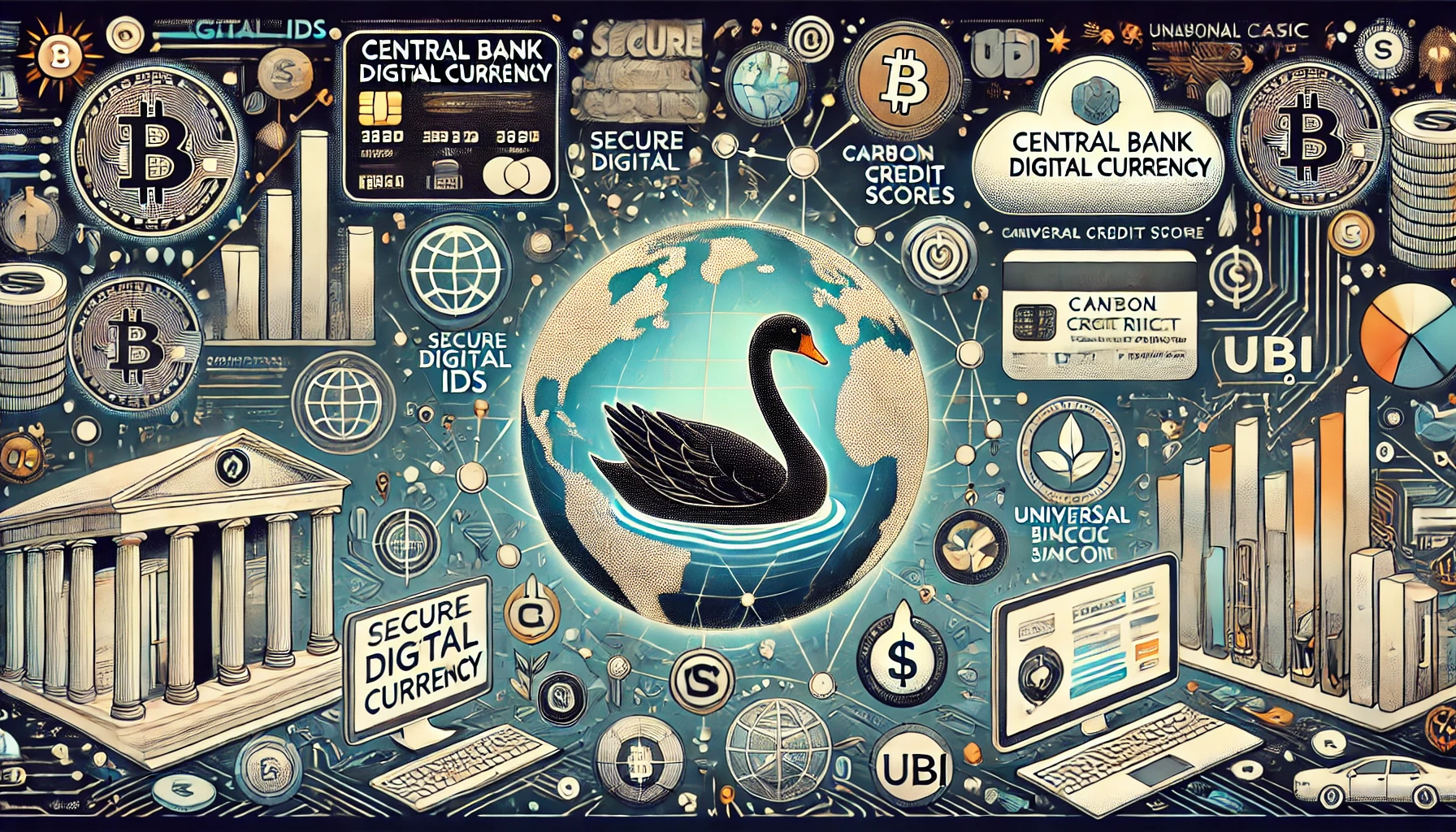In an increasingly interconnected and volatile world, the prospect of another black swan event—a rare and “unpredictable” occurrence with severe consequences—looms large. Whether it be another global plandemic, a financial crisis akin to the Global Financial Crisis (GFC) of 2008, or even a world war, such events could serve as a catalyst for profound changes in economic and social structures. One area poised for transformative development is the integration and implementation of advanced digital technologies. This article explores how a future black swan event could accelerate the adoption and linkage of digital ID systems, Central Bank Digital Currencies (CBDCs), carbon credit scores, Universal Basic Income (UBI), and other related innovations.
Understanding the Concepts
Before diving into the potential future scenarios, it’s essential to understand the core concepts:
- Digital ID Systems: Secure electronic records of individuals’ identities, verified and authenticated by digital platforms.
- Central Bank Digital Currency (CBDC): Digital form of a country’s official currency, issued and regulated by the central bank.
- Carbon Credit Scores: Systems that assign carbon credits to individuals based on their carbon footprint, incentivizing environmentally friendly behaviors.
- Universal Basic Income (UBI): A regular, unconditional sum of money provided by the government to all citizens. It could be of the form of jobkeeper or jobseeker as seen during the pandemic; or an often joked about “mortgage keeper”.
The Role of Digital ID in Crisis Management
In times of crisis, the need for efficient and secure identification systems becomes paramount. Digital ID systems can streamline access to critical services, ensuring that aid reaches those who need it most. During the COVID-19 pandemic, the MyGov platform in Australia exemplified this by facilitating access to government services and support schemes like JobKeeper.
Hypothetical Scenario: A Global Pandemic 2.0
Imagine a future global pandemic more severe than COVID-19. The immediate response would require rapid distribution of vaccines, financial aid, and other resources. Digital IDs could:
- Facilitate Contact Tracing and Health Passports: Linking digital IDs with health records can streamline contact tracing and ensure that only vaccinated individuals access certain public spaces.
- Distribute UBI Efficiently: Governments could deploy UBI through CBDCs linked to digital IDs, ensuring timely financial support without the risk of fraud or delays.
- Implement Carbon Credit Scores: With reduced economic activity, carbon credit scores could incentivize sustainable behaviors during recovery phases.
Financial Crisis: GFC 2.0
A second Global Financial Crisis could destabilize traditional banking systems, highlighting the need for more resilient financial infrastructures. In such a scenario:
- CBDCs as a Safe Haven: As traditional banks face liquidity crises, CBDCs issued by central banks could provide a stable alternative, preventing bank runs and ensuring continuity of financial transactions.
- Enhanced Monetary Policy Implementation: CBDCs allow for more precise implementation of monetary policies, such as direct stimulus payments to citizens’ digital wallets.
- Support for SMEs: Digital IDs and CBDCs can facilitate swift financial aid to small and medium-sized enterprises, crucial for economic recovery.
World War and Geopolitical Instability
A global conflict would disrupt traditional economic and social systems, necessitating robust digital solutions:
- Secure Transactions: CBDCs, backed by central banks, could ensure secure and reliable transactions even amidst geopolitical turmoil.
- Cross-Border Aid and Remittances: Digital IDs linked with CBDCs can streamline cross-border financial aid and remittances, essential during wartime.
- Universal Basic Income: In the aftermath, UBI distributed via CBDCs can provide a safety net for displaced populations and those affected by the conflict.
Linking Technologies for a Holistic Approach
The integration of these technologies—digital IDs, CBDCs, carbon credit scores, and UBI—can create a cohesive system capable of responding to future crises. The potential benefits include:
- Resilience and Flexibility: A digitized financial and identification system can adapt quickly to changing circumstances, providing stability during crises.
- Efficiency and Transparency: Digital systems ensure efficient resource distribution and transparent governance, reducing corruption and ensuring accountability.
- Sustainability and Innovation: Incorporating carbon credit scores encourages sustainable practices, while the use of advanced technologies fosters continuous innovation.
Challenges and Considerations
While the potential benefits are significant, several challenges must be addressed:
- Privacy and Security: Ensuring the privacy and security of digital identities and transactions is paramount to prevent misuse and protect user data.
- Regulatory Compliance: Developing comprehensive regulatory frameworks to address issues such as anti-money laundering (AML) and combating the financing of terrorism (CFT) is crucial.
- Public Trust and Acceptance: Building public trust through effective communication and education strategies is essential for widespread adoption.
Global Trends and Preparations
Several countries and organizations are already exploring these technologies in preparation for future uncertainties:
- China: The digital yuan (e-CNY) pilot programs demonstrate the potential of CBDCs in enhancing financial stability and efficiency.
- Sweden: The e-krona project explores how digital currencies can complement existing monetary systems.
- European Union: The European Central Bank’s assessment of a digital euro aims to strengthen the financial infrastructure.
- World Economic Forum (WEF): Advocates for the use of digital IDs and CBDCs to enhance financial inclusion and public policy implementation.
- International Monetary Fund (IMF): Provides research and guidelines on the adoption of CBDCs, highlighting their transformative potential.
In the face of an unpredictable future, the integration and deployment of advanced digital technologies can provide a resilient and efficient response to potential black swan events. By linking digital IDs, CBDCs, carbon credit scores, and UBI, governments can ensure stability, transparency, and sustainability in times of crisis. As global trends indicate a move towards these innovations, it is imperative for countries to prepare and embrace the digital transformation.
References
- Reserve Bank of Australia. “Central Bank Digital Currency: Opportunities, Challenges, and Design.” Accessed July 2023. https://www.rba.gov.au/
- International Monetary Fund. “CBDCs: A New World of Money and Payments.” Accessed July 2023. https://www.imf.org/
- World Economic Forum. “The Digital Currency Governance Consortium.” Accessed July 2023. https://www.weforum.org/
- Bank for International Settlements. “CBDC Projects and Research.” Accessed July 2023. https://www.bis.org/
- People’s Bank of China. “Progress of Research & Development of E-CNY in China.” Accessed July 2023. http://www.pbc.gov.cn/
Discover more from Kango Anywhere
Subscribe to get the latest posts sent to your email.




